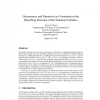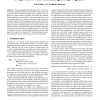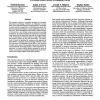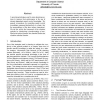105
click to vote
AAAI
2011
14 years 2 months ago
2011
Recently the general Game Description Language (GDL) has been extended so as to cover arbitrary games with incomplete/imperfect information. Learning‚ÄĒwithout human intervention‚...
109
click to vote
LOGCOM
1998
15 years 1 months ago
1998
The Situation Calculus is a logic of time and change in which there is a distinguished initial situation ¬°¬£¬Ę and all other situations arise from the different sequences of acti...
142
click to vote
ECAI
2010
Springer
15 years 3 months ago
2010
Springer
Abstract. The agent programming language GOLOG and the underlying Situation Calculus have become popular means for the modelling and control of autonomous agents such as mobile rob...
125
click to vote
IJCAI
1989
15 years 3 months ago
1989
We consider the role played by the concept of action in AI. We first briefly summarize the advantages and limitations of past approaches to taking the concept as primitive, as emb...
113
click to vote
AAAI
1994
15 years 3 months ago
1994
In this paper we consider updates that are specified as rules and consider simple knowledge bases consisting of ground atoms. We present a translation of the rule based update spe...
128
click to vote
AAAI
1994
15 years 3 months ago
1994
The situation calculus is a popular technique for reasoning about action and change. However, its restriction to a firstorder syntax and pure deductive reasoning makes it unsuitab...
143
click to vote
IJCAI
1997
15 years 3 months ago
1997
As an alternative to planning, an approach to highlevel agent control based on concurrent program execution is considered. A formal definition in the situation calculus of such a ...
102
click to vote
AAAI
2000
15 years 3 months ago
2000
High-level robot controllers in realistic domains typically deal with processes which operate concurrently, change the world continuously, and where the execution of actions is ev...
109
click to vote
IJCAI
2003
15 years 3 months ago
2003
A promising technique used in some planning systems to improve their performance is the use of domain dependent search control knowledge. We present a procedure for compiling sear...
142
click to vote
AAAI
2006
15 years 3 months ago
2006
DTGolog, a decision-theoretic agent programming language based on the situation calculus, was proposed to ease some of the computational difficulties associated with Markov Decisi...




